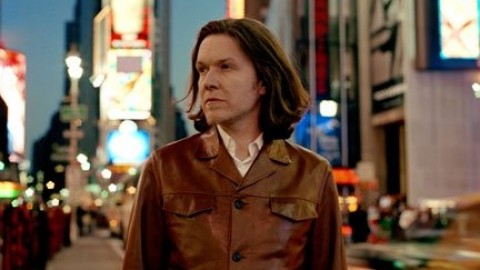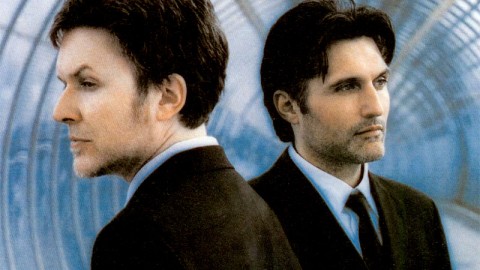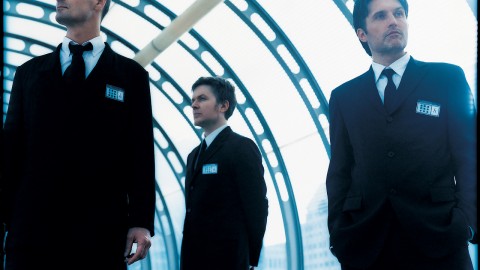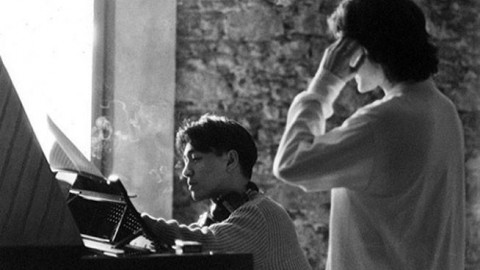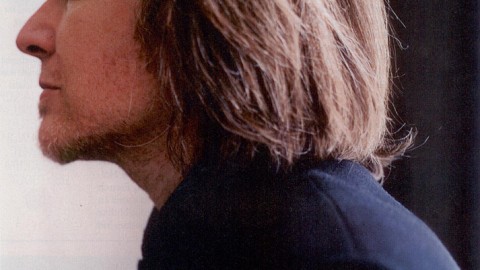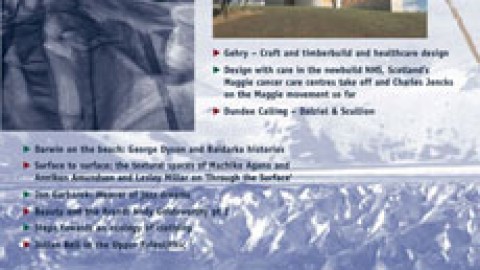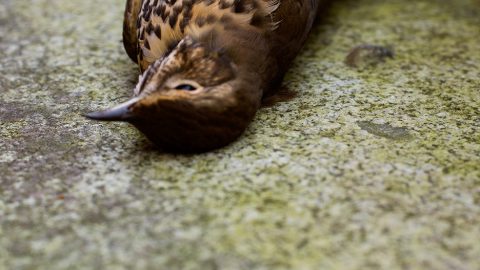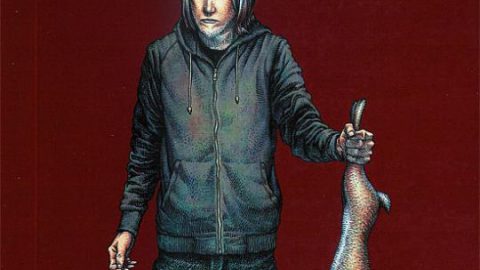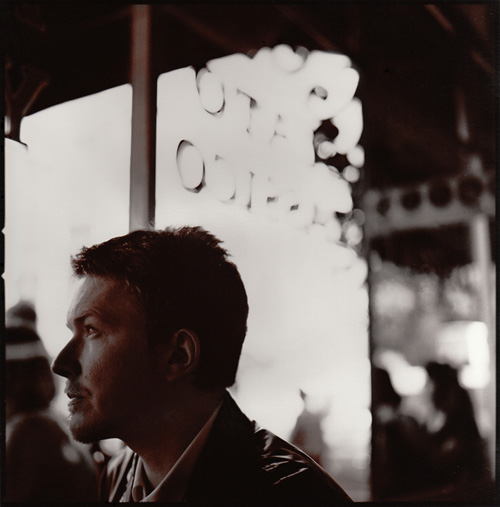
Interview with David Sylvian by Tony Bonyata, Dec. 17, 2000
Although far from a household name, David Sylvian, nonetheless, holds a respectable place on the fringe of rock music. Writer, producer, singer, musician, co-conspirator of the ‘new romantic’ movement of the late ’70s, photographer, painter and installation artist, Sylvian is actually more of an artist’s artist. But this multi-talented renaissance man would renounce all other mediums in the name of his true passion – music.
Livewire’s Tony Bonyata got the opportunity to discuss everything and nothing with this elusive artist, who has just released a career spanning retrospective album. .
Livewire: You’ve just released a compilation album of your solo work and collaborations. Why did you opt not to do the traditional “greatest hits,” and instead make this an album of rarities and remixes?
David: For a number of reasons really. Firstly, Virgin wanted a compilation album and asked me to get involved. I always wanted to get back to this material and have a bash at completing it, and I was just waiting for the right opportunity to arrive and this seemed an appropriate time. The climate of the times, being what they are, and Virgin owning this material, I thought I ought to get it out now rather than later. You can never be too sure where you stand these days with labels. Also to create a ‘best of’ album in the real sense of the word – that it did represent the best of my work and it was something of a concise overview of the last twenty years. It seemed an appropriate point in time to go back and reflect and create a work of this kind, a work that would act as both a wonderful introduction, for people that hadn’t heard my work before, but also enhance the catalog that is already out there, that people are already familiar with. So different parties of all kinds can come to the work and enjoy it.
Livewire: It really does work well as an introductory piece.
David: Well, I hope so. I’m aware that a lot of people, particularly in Europe, have stopped listening to what I was doing once Japan broke up. I think that a lot of those listeners might be drawn back in just see what has happened in the intervening period, where I’ve feel I’ve created my best work. So I thought that it was worthwhile doing that. And I think a lot of people will be drawn into the unreleased material for a variety of reasons.
Livewire: Why do feel you lost some of your audience with the breakup of Japan?
David: Because the work I did with Japan was commercially far more accessible than the work I’ve been doing in my solo and collaborative work in the years since then. I was very aware that I was moving away from the center, if you like. It was a conscience move. It’s where my interest led me and where I felt most comfortable working as an artist. I was aware that there would be a ‘falling away’ of a number of the people who were into the more commercial aspects of the work I was doing with Japan. It’s self evident.
Livewire: What does the title “Everything and Nothing” mean?
David: Well, there’s a couple of ways to look at it. I thought it worked well as the title for the compilation. The best of, in a sense, represents the best of your work to date, so in that sense it’s the best of everything I’ve been doing up until now. But I felt that reviewing the work, I could become attached to it’s relevance in the world. It may be totally irrelevant, but somehow I have to justify my creations – the creating of the work. And for me the important part of creating the work is in the actions – through writing and recording it. That in itself is fulfilling. It was kind of harder to look at the work and just say, ‘this may be entirely irrelevant, but that’s ok.’ I can live with that because of what it’s meant to have created this work in my lifetime. So in that sense it was everything and nothing- simultaneously. It’s been everything to me – it’s been the focus of my life, but in a sense it’s almost immaterial. The final results of the work is the process of creation. But on a more serious level, it was also to do with the content of the work, which is so often the focus of the spiritual journey undertaken, and what the ultimate goal might be perceived as. By some it’s perceived as the merging with the unity, divinity, the oneness, the everything. In another sense it seemed, particularly by the Buddhists, as the void, the great emptiness, the nothing. So it was alluding to the subject matter of the material as seen from different perspectives.
Livewire: I noticed that one of the discs is titled ‘everything’ and the other ‘nothing.’ Did you choose the songs to fit within those perimeters?
David: Not really, no. It really was down to design.
Livewire: You’ve collaborated with a quite a number of talented musicians and artists throughout your career – most notably your long working relationship with Ryuichi Sakamoto. Do you have any plans of working with him in the future?
David: It’s funny, Ryuichi and I have never planned the project we were currently working on. So it’s been odd but wonderful that the collaboration has been ongoing. Funny enough, we were just speaking the other day about him coming to the house and writing some material together. It’s very likely that the collaboration will go on. But we never make long term plans.
Livewire: Is there anyone that that you haven’t worked with that you’d like to collaborate with in the future ?
David: I’m sure there are many musicians that I would love to work with. But the process of selecting potential collaborators is really down to the material itself. When I start writing, or particularly when I start arranging a piece of music, certain voices come to mind, obviously voices within my own frame of reference. So I’ll make a connection between, let’s say Jon Hassell’s trumpet on a particular composition I was working on for “Brilliant Trees.” I made a connection there while arranging the piece of music, and I felt that if John was given an opportunity to hear this work, he might also make a connection between his style of performance and this particular composition. So that’s the way it’s worked for me. These people have come into the sessions and as a result I’ve had wonderful performances from the people that I’ve worked with over the years, because these are rather intuitive connections made, rather than just having a wish list of people that I would love to work with.
Livewire: You’ve been involved in many different elements of the creative arts outside of the musical realm, with your film, photography and writing work. Do find more fulfillment from any one of these mediums over the others?
David: For me music remains the primary medium, because it’s an area that I’ve worked in for so long now. I feel I’m at my most eloquent as a writer and composer. It’s a challenge for me to move into other areas of work, but I thoroughly enjoy it. In a sense, the challenge is to find my own voice in these other areas – to become as eloquent as I am in music. But I would renounce all other activities in favor of music because it’s so important to me.
Livewire: Do you still use the Polaroid as a medium?
David: No, not really. I tend to do far more painting now than photography.
Livewire: Are there any plans for future art exhibitions?
David: Not right now, no. It’s funny, the installation work that has come up over the years has come to me. Although, I’ve thoroughly enjoyed it, I never actually pursued work in that area . I found it an enormous challenge that I was unable to turn my back on. If it should surface again I’m sure the result would be the same – I would have to take it on. It would be a wonderful opportunity. But it’s not an area of work that I actively pursue.
Livewire: How do you perceive your former band Japan fitting into the whole realm of musical history?
David: That’s a very difficult question for me to answer…I don’t think I want to answer.
Livewire: Well then what are your feelings about Japan?
David: For me Japan was a wonderful schooling, a wonderful period of learning. We made enormous mistakes – I think we learned a lot from our failures, more so than our successes, I think. I learned how to write for a particular lineup of musicians. I learned how to produce – how to get the best out of other musicians. It was a wonderful schooling, and I really don’t look at it as anything more than that. I think that I’ve produce my best work after the breakup of that band. But I couldn’t have done it without working within the contents of that band for 5 or 6 years of my life.
Livewire: Yet, you decided to reunite with former Japan members in 1990 for your “Rain Tree Crow” project. How was it working with them after a 6 year absence?
David: It seemed worthwhile, I’d been working with improvisation with Holger Czukay [from the German avant garde rock band Can] in the studio, and I wanted to expand on that, and I was looking for a band of sorts that would have a loose lineup that would change from project to project. And then the notion of working with the ex-members of the band came up, and I thought this will be a wonderful opportunity to really explore those relationships further. We were always working with my material in Japan, and very rarely opened up and improvised together. I really respected the individuals as musicians and I wanted to see what could be drawn out of them in working in this particular process. They were very much up for it and it was a very exciting time working on that project. But the personalities ultimately clashed toward the end of the project and although we were initially talking about doing a second or third album, and possibly touring, it just wasn’t to be. Mainly due to external pressures. But I don’t regret undertaking the project. I thoroughly enjoyed it and I learned quite a lot in the process.
Livewire: You mentioned ‘external pressures.’ You mean the pressures of having to live up to the Japan expectations, since it was essentially the same band members?
David: No, it was more to do with the pressures that came from the label, that came into play. Really once the album was completed, we needed an influx of cash to finish it and it wasn’t forthcoming from the label. And then a lot of pressure came on us to market the album as Japan, blah, blah,blah. Commercial pressures.
Livewire: How do you feel about your project with Robert Fripp on “The Last Day”?
David: I don’t feel particularly close to it.
Livewire: Because it’s more Robert, you feel?
David: Yes, you could say that, in that it was Robert who instigated the project. Robert selected the musicians for the work, who eventually went on to form the new [King] Crimson. So, yes, I was definitely working within a context created by Robert. That’s not really the reason why I don’t feel close to it, though. I think that we were working at a point in time when we had both had external crisises going on outside of the material that we were working on. I often think that it was amazing that we ever got any work done together, because there seemed to be so much going on. Again, I learned a lot from working with Robert, particularly in the area of live performance. He really opened my eyes to the joys of live performance, which had eluded me right up until that moment in time. But I think in the studio things didn’t hold together quite as well. We had very different ways of working. I mean Robert’s a one take, two take kind of guy and I like to work on material endlessly – editing and reworking material. So we weren’t actually working that closely in the studio with one another. Robert would come in the morning and lay down a track and I’d spend the rest of the day editing his performance or working on something of my own. It was a strange way of working and ultimately I felt somewhat dissatisfied with the final product, although I felt there were wonderful moments on the album. It was a necessary work. It was a wonderful catalyst for me. It helped me get through a very difficult period, and I think it worked the same way for Robert as well.
Livewire: I read somewhere in the past that Robert actually invited you to join King Crimson.
David: Well that was the offer that was on the table – to join Crimson initially. When I felt that I couldn’t take on that history, he came up with the Sylvian / Fripp project, which is Crimson by any other name, really.
Livewire: Do you feel that by working with different people, it helps pull different creative elements out of yourself?
David: Oh, for sure, that’s the challenge. That’s why I got involved in so much collaborative work toward the end of the ’80s and the beginning of the ’90s. I wanted to challenge myself as a writer and as a performer. I wanted to expand my horizons, if you like – see what I was capable of. Working with Rain Tree Crow was the most satisfying in that respect. You just enter into a studio and you don’t speak about musical directions, you don’t speak about music specifically at all. You just set up and you start performing. It’ s a wonderful experience to get into a situation where something intangible is happening, and you’re all very much aware of it. There’s the glance of the eyes around the room and you all know, yes, something is happening. And you respond to it there and then. As much as I enjoy writing my own material, and I think I produce my strongest material when I’m writing alone, there is a different element that comes into play when working as a group – improvising material into shape. And especially when you’re working in the studio and it goes straight to tape. It brings a level of spontaneity – of excitement. It’s like a live spark that gets caught. And I must say it’s an area of work that I think I will constantly return to, to allow me to reinvigorate myself in some way and return to my solo work with greater fire and greater passion.
Livewire: It seems that your wife, Ingrid, has been a strong influence on your work.
David: Oh, undoubtedly, yeah. Obviously we influence one another enormously through every aspect of our lives together. So it is going to see into the work as well. Even influencing what we listen to. Whether driving around in the car across America, which we’ve done numerous times, you soak in the influences. Ingrid’s leanings are far more towards contemporary pop music than mine would be, so I soak in a lot more in that area, and I think that’s good for me. And she’s far more critical of the more, let’s say, esoteric work that I create, and I think that’s really helped me to focus as a songwriter again. I’m very grateful for that.
Livewire: I understand she’s originally from Prince’s camp. Does she still record?
David: She hasn’t recorded outside of the projects that we’ve done together. She really pours all of her creative energies into the family. But I get the sense that she’s beginning to yearn to return to writing, and I’m trying to encourage her as best I can. I think it would be wonderful if she did get back into writing.
Livewire: How long have you lived in the States?
David: I guess it’s going on eight years now.
Livewire: You’re in California now?
David: No, I’m back on the east coast. I’m in New England. I’m just trying to settle in here. It’s quite a change from the west coast.
Livewire: You’ve jumped around a lot since your initial move from England – from the midwest to the west and now out east.
David: Yeah, that’s right. It’s been an odd journey. I was very happy in the Midwest. It really worked for me. It was something of a retreat. I’ve lived and worked in London all my life and to move to Minneapolis and move away from the center was actually kind of wonderful. It allowed me to be a father for awhile without any other external pressures coming into play. California was another experience entirely, but we got so much out of living out there. We were with spiritual leaders who live in California, and that was marvelous. But ultimately we needed more land, more space, we needed the change of seasons. So we took an opportunity when some property arose in New England through friends, and just moved here just a couple of months back. So were still settling in.
Livewire: Have either your writing style or approach to writing changed with your moves across the States?
David: For me work is born out of something much deeper than the superficially aspects of one’s immediate environment. For the subject matter the content of the material remains consistent and true. It’s really hard to say how the immediate culture plays as an influence.
Livewire: You mentioned spiritual leaders earlier. Are you practicing Buddhism?
David: My practice is an amalgam of Hindu and Buddhist teachings. My guru actually lives in India. She comes to America, but she also travels throughout the world annually. So I see a fair amount of her, personally. But I don’t need to be in the physical presence of my teacher. A lot of the work is done in absence of her physical presence.
Livewire: There’s a certain sensuality and emotional charge to your music and your vocals. Is that something you plan on adding to your music or does it happen naturally?
David: It’s not contrived. It’s a matter of being intuitively true to the material , without histrionics and melodramatics and over-embellishing the music. I just try and lend as much potency to the work as possible. I mean, I fail all the time, of course, but that’s the goal.
Livewire: Is there an individual album or song of yours that you’re particularly fond of?
David: Sure. I’m very close to the last album I made – the “Dead Bees [on Cake]” album, because it was written and recorded over a period of four years, and that four years just happened to be one of the most eventful, enriching periods of my life. So therefore it mirrors that time back to me in a marvelous way. Because I was allowed to work on it for that duration I felt I brought that particular project to a point of completion that has often eluded me in earlier work. So that project is very close to my heart.
Livewire: You’ve added touches of jazz throughout your work. Have you ever thought of producing a true jazz album of your own?
David: It’s crossed my mind – certainly earlier on, back in the late ’80s. But I’m not a technically proficient player. In fact, I quite glorify that I have these shortcomings – that you have to find creative ways of overcoming in the studio. I enjoy working with non-musicians as much as truly proficient musicians. I find that quite exciting and a wonderful combination.
Livewire: How do you work with a non-musician?
David: Well, I consider myself a non-musician. I consider the ex-members of the band Japan all non-musicians, in that we’re all self-taught. There are areas of our knowledge which are quite well developed, and there are areas which are relatively under-developed. Holger Czukay, another non-musician, has an idiosyncratic approach to creating music. When working in the studio with these musicians, let’s say you have a break and you’re going to put a piano solo in, but nobody is proficient enough to be able to perform a piano solo. So what do you do? You have to find creative ways around the problem, and often the solution to that problem is far more interesting than the piano solo you might have come up with, had you been technically proficient enough to perform it. I love that. That really lends a creative edge to the process of recording material. Then you have the technically proficient players who come in and respond to the work that’s there, in a purely intuitive, off-the-cuff manner. And that lends a vitality to the work. It’s this combination that I thoroughly enjoy. I guess that the leanings that I had towards jazz led me to work with Czukay and also the Rain Tree Crow project, where improvisation played an enormous part in the creation of the material. But it didn’t necessarily push it into the realm of jazz. And maybe that’s a good thing. It allowed us to experience the spirit of improvisation on our own terms.
Livewire: Do you have any plans for a tour to support “Everything and Nothing”?
David: I’d really love to be able to represent this material well, particularly the material from “Dead Bees,” and that means having a band behind me. And right now the climate doesn’t seem right for that. I just can not seem to rally up the troops and get the financial backing to allow me to do it. I’m still looking into it and I haven’t given up hope. There’s a slight possibility I could get out the middle of next year. If I can, I will.
Livewire: Do you have plans for a new solo record?
David: That will be the next project that I undertake.
Livewire: If it were possible, would you do any of it different?
David: You know, looking back there are numerous things you’d do differently. But you know that living through exactly the same circumstances, the likelihood is that you’d make the same mistakes again and you’d learn from them in the same way and move on. The mistakes and the failures are as necessary as the successes. In fact, I would say more so. And they may be embarrassments when you look back on the work, but there is no other way you could have handled it – and you know that. So hindsight’s a dangerous thing.
Original article on concertlivewire.com
